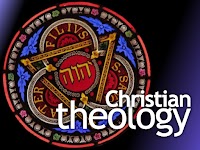
Whenever I bring up the Apostles Creed to Christians, I tend to get one of two reactions: Positive and negative.
The positive response tends to come from Christians who grew up in
If they didn’t grow up in such churches, or their churches never taught it to ’em, they might still know it. ’Cause they learned it as lyrics from a Rich Mullins song. Or someone else’s cover of that song. Or John Michael Talbot’s song, though that’s lesser-known.
Negative responses typically come
The
- I believe in God,
- the Father, almighty, creator of heaven and earth.
- And in Christ Jesus, his only Son, our master.
- He was conceived by the Holy Spirit;
- born from the virgin Mary.
- He suffered under Pontius Pilate,
- was crucified, died, and was buried.
- He descended to the afterlife.
- The third day, he was resurrected from the dead.
- He ascended to heaven;
- he sits at the almighty Father’s right hand.
- From there he will come;
- he is judging the living and the dead.
- I believe in the Holy Spirit,
- the holy catholic church,
- communion of saints, forgiveness of sins,
- bodily resurrection, and eternal life.
- Amen.
A creed, like this creed, is
Tradition has it the Apostles Creed is the very oldest of the creeds—even that it was written by
Using the Apostles Creed.
One of the more common Christian mistakes is we believe our beliefs make us Christian: We’re Christian
We even get a little of that in Rich Mullins’s song, in the chorus:
- And I believe what I believe
- Is what makes me what I am
- I did not make it
- No it is making me
- It is the very truth of God
- And not the invention of any man
True, what we believe influences who we are. But more importantly, more central to Christianity, is not our beliefs, but whom we follow. What makes us Christian is we follow Jesus. When we intentionally, devoutly follow him, he makes us Christian. Not our belief system; not our orthodoxy. True, when we authentically follow Jesus, our beliefs usually get sorted out and become orthodox. But Jesus is the locomotive pulling the train. Not our beliefs.
Creeds are simply part of this sorting-out process. Again, like Mullins wrote, we don’t make it: We don’t invent our own faith statements, and pick ’n choose some
When we truly follow Jesus, our religion isn’t gonna be our own individualized hodgepodge of beliefs, a reflection of ourselves
Likewise, knowing the creeds doesn’t make us Christian, nor do they make us saved. They only prove we know what true Christians oughta believe. Now we gotta do the good work of believing it, and living it out. When we do, we’re more likely to hand down the stuff previous Christians have always believed—the apostles’ traditions, the scriptures’ truths. We’ll believe
We’ll believe Jesus has, and runs, a universal church. Which transcends all our denominations and little local churches. We’ll agree Christians should love our neighbors and enemies, forgive others, and meet regularly for worship and good works. We’ll believe when Jesus returns, he’ll resurrect us, and we’ll live forever with him.
If we don’t, we may still call ourselves Christian—and many do—but we’ll be heretic. We’ll have incorrect beliefs about God which inevitably get in the way of a growing, healthy relationship with him. Beliefs which could even in the way of our salvation.
From time to time I meet people who claim they’re Christian, and orthodox… yet can’t conform to the Apostles Creed. They don’t really believe Jesus was concieved by the Holy Spirit, but by Joseph of Nazareth. They don’t really believe he went to the afterlife when he died; they think he bypassed that and went to heaven (
No they don’t.

